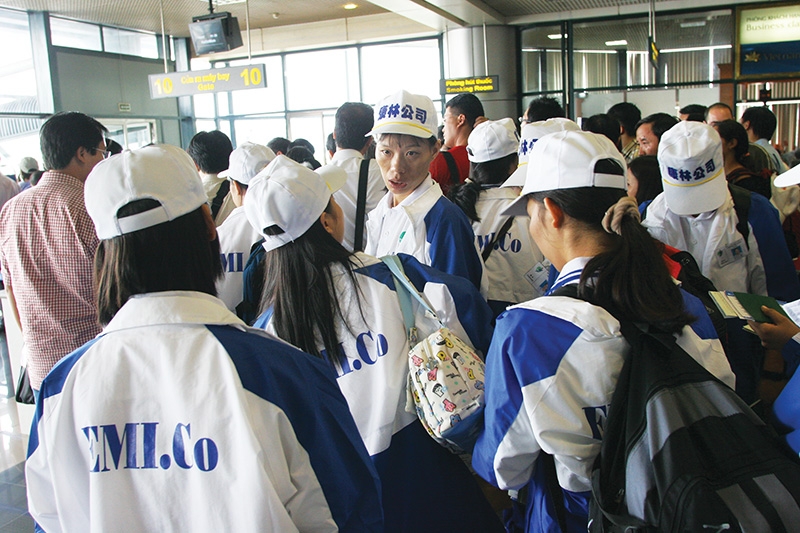Labour export slowed down amid pandemic
 |
| The goal of sending workers abroad has been adjusted to around 70,000. Photo: Duc Thanh |
After completing a language training course and related certificates by the end of April, Hoang Thi Niem from the northern mountainous province of Yen Bai told VIR that she would have to wait until the end of June before leaving for Taiwan (China) to work, a long delay compared to the company’s initial plans. At the time, Taiwan along with many other markets temporarily stopped accepting Vietnamese workers in order to prevent further outbreaks of COVID-19.
“During those two months, I was in a state of stress every day, worried that the waiting time would be prolonged further,” Niem said. “The amount of more than VND100 million ($4,300) paid for service fees, school fees, and accommodation was purely a loan and slowly, the interest will become a burden.”
Fortunately, Taiwan quickly controlled the pandemic there and began to reopen its doors to foreign workers. Niem and more than 300 other Vietnamese workers got there as soon as they could, most of them working in factories or taking care of the elderly in nursing homes. Workers languishing while waiting for departure after completing all necessary procedures is not an uncommon situation this year. Most Vietnamese workers have to wait around 1-2 months, but in some cases, schedules have been delayed for double that time.
Nguyen Canh Viet from the central province of Ha Tinh could not enter Japan to work even though there was a set schedule from the beginning of May. “The company does not know when departure will happen, and it was told to wait for the Japanese side to make a decision. I also did not dare to apply for another job although I am now very impatient,” said Viet.
According to statistics from the Ministry of Labour, Invalids and Social Affairs (MoLISA), in the seven months of this year, Vietnam sent more than 36,000 people to work abroad, 49 per cent lower than the same period in 2019. The low number is due to the fact that some markets such as Japan, South Korea, and Taiwan, which account for 90 per cent of the total number of Vietnamese guest workers, have been affected by COVID-19 so they stopped receiving workers from Vietnam. In particular, the number of Vietnamese workers in the Japanese market reached 21,130 people, a drop of 25.57 per cent over the same period last year. Meanwhile, the number going to work in South Korea is 760, a fall of 73.67 per cent.
Nguyen Tien San, representative of the Vietnam Association of Manpower Supply (VAMAS), said that many Vietnamese workers had their working hours and income reduced, while many have been given long-term leave with benefits worth 60 per cent of their basic salary, with those in manufacturing and mechanical processing most affected.
VAMAS stated that, even when activities to bring workers are restarted, the scale of workers going to work abroad will decrease severely compared to previous years. This situation means many enterprises in the labour export business in Vietnam face the risk of dissolution.
Le Thien, director of Hanoi HTD Company – which mainly sends workers to Japan and South Korea – said it could send 150-200 employees to work each year. However, since the beginning of 2020, the company has only sent 20 workers abroad, with the rest being forced to cancel. Many of them have both completed a training programme and been granted a visa but cannot yet depart.
Thien also shared that the outbreak of the disease has significantly affected people’s psychology. Therefore, consulting them to participate in labour export programmes can be difficult, while workers do not have many opportunities to choose suitable orders and occupations as previously because foreign employers are also seriously affected.
After a period of slowdown from the end of March to May, the labour export situation in Vietnam has nevertheless shown positive signs with some key markets such as Japan, South Korea, and Taiwan all seeking to receive Vietnamese workers again to restore production and business after the pandemic.
According to the MoLISA’s Department of Overseas Labour, Taiwan has fully opened to accept Vietnamese workers since early May. In addition, Vietnamese workers can also return to work in Malaysia after August 31. The Japanese market is also in need of receiving Vietnamese workers, with the Embassy of Japan in Vietnam officially starting to accept new visa applications for Vietnamese citizens from July 29.
What the stars mean:
★ Poor ★ ★ Promising ★★★ Good ★★★★ Very good ★★★★★ Exceptional
 Tag:
Tag:
Themes: COVID-19
- 67 million children missed out on vaccines because of Covid: UNICEF
- Vietnam records 305 COVID-19 cases on October 30
- 671 new COVID-19 cases recorded on October 1
- Vietnam logs additional 2,287 COVID-19 cases on Sept. 21
- People’s support decisive to vaccination coverage expansion: official
Related Contents
Latest News
More News
- NAB Innovation Centre underscores Vietnam’s appeal for tech investment (January 30, 2026 | 11:16)
- Vietnam moves towards market-based fuel management with E10 rollout (January 30, 2026 | 11:10)
- Vietnam startup funding enters a period of capital reset (January 30, 2026 | 11:06)
- Vietnam strengthens public debt management with World Bank and IMF (January 30, 2026 | 11:00)
- PM inspects APEC 2027 project progress in An Giang province (January 29, 2026 | 09:00)
- Vietnam among the world’s top 15 trading nations (January 28, 2026 | 17:12)
- Vietnam accelerates preparations for arbitration centre linked to new financial hub (January 28, 2026 | 17:09)
- Vietnam's IPO market on recovery trajectory (January 28, 2026 | 17:04)
- Digital economy takes centre stage in Vietnam’s new growth model (January 28, 2026 | 11:43)
- EU Council president to visit Vietnam amid partnership upgrade (January 28, 2026 | 11:00)






















 Mobile Version
Mobile Version